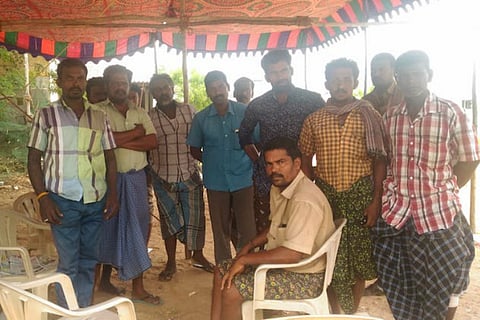

With a makeshift pandal pitched in puddles around the house, Ranjith Kumar’s father sits down with a heavy heart. As family members bring him a newspaper to read, their attempts to distract him from looking at his son’s photograph work, albeit temporarily.
22-year-old Ranjith Kumar was one of the 13 caught and killed in the brutal police shooting in the coastal district of Thoothukudi on Tuesday. Like many others, Ranjith too had gone to witness the 100th day of the anti-Sterlite protest.
“What questions do you want to ask? Have you met the families of the other deceased? Answer this and we will let you speak to him,” says Ranjith’s cousin. The town that has been at the centre of violence for the past few days has grown distrustful of the media, who they believe have shown interest in their problem only after lives have been lost.
Kumar, Ranjith’s uncle states, “This was a pre-meditated murder. He was not there to protest. He did not raise slogans. He went along with his friends to see the protest and take videos. He got caught in the crowd. They have planned this in advance. They wanted to disperse the protesters by instigating violence.”Kumar says, “He was a boxer, he would wake up at 5am and exercise. He would organise blood donation drives in the neighbourhood. He would donate blood at least once a week. He would help people on a regular basis, whether it was to give blood or to give money to a starving person on the street. He was just a child.”
A feeble-voiced Bhaskar suddenly breaks his silence. “He wanted to join the military, that was his only goal. He had recently gone to Ramnad district for a selection trial but did not make it. I told him that not everyone gets selected in their first attempt. He said he would try again,” says the father of the 22-year-old.Kumar continues, “His whole world was home and the gym. He would never go anywhere near trouble. Even on Tuesday, he ate at home and left at 11.30am. We didn’t know he was going to watch the protest. Had we known, we would have called him and asked him to come back. By 12.30pm, we got a call saying that he was dead in the firing.”
A daily wage labourer, Bhaskar has lost his only child. He says, “They didn’t give him any treatment. They took him straight to the mortuary and kept him in the freezer. The village officer has been calling me to come and sign off on the post-mortem report. We have not gone. They want us to authorise what they have done.”Like the family of the 12 others, Ranjith’s family too understands the political statement of not taking their son’s body back. “We can take the body back and cremate it and we can go home. What about the others who were there to protest? If they all go to the hospital and are satisfied, we will also go. We don’t want to create problems with the ones standing with us. This is a scar that will never leave us. We don’t want to add to it,” says Kumar.
When asked about the anger over the political leaders and authorities in the state, Kumar shoots back, “The officials could have avoided this with talks. But they didn’t. Now we have lost our son. We have nothing to say about the leaders and the authorities or anyone else. We don’t care about them. What good will come out of criticising the government anymore?”